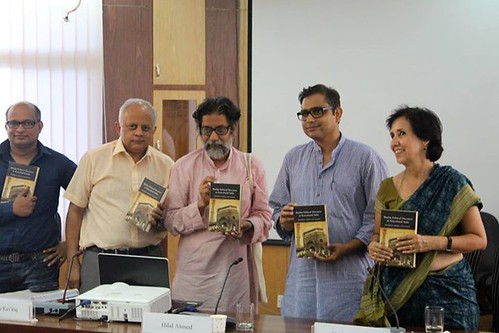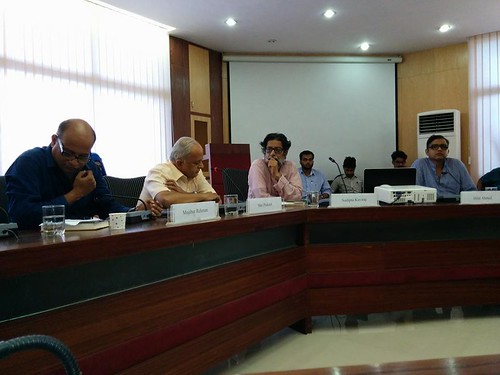Besides Introduction and Conclusion, the book has a chapter each on ‘monumentalisation’ in colonial and post-colonial India. The subsequent two chapters are case studies on “Jama Masjid and the Political Memory of a Royal Muslim Past” and “Babri Masjid and the Muslim Politics of Right to Heritage.”
By M Reyaz, TwoCircles.net,
New Delhi: A new book on titled “Muslim Political Discourse in Post-Colonial India: Monuments, Memory and Contestation” written by Dr. Hilal Ahmed, Assistant Professor at the Centre for the Study of Developing Societies (CSDS), was launched at the Ho Chi Minh Conference Hall of the Academy of International Studies, Jamia Millia Islamia in the National Capital on August 20.
The book launch was followed by a panel discussion with the Panelists – 1) Prof. Sudipta Kaviraj, Columbia University, USA, 2) Prof. Shail Mayaram, CSDS, New Delhi and Dr. Mujibur Rehman, Jamia Millia Islamia. Prof. Shree Prakash, Director, Academy of International Studies, JMI was the Chair the session.

This book from Routledge examines the post-colonial Muslim political discourse through monuments. It establishes a link between the process by which historic buildings become monuments and the gradual transformation of these historic / legal entities into political objects. The author studies the multiple interpretations of Indo – Islamic historical buildings as political sites as well as emerging Muslim religiosities and the internal con gurations of Muslim politics in India. He also looks at the modes by which a memory of a royal Muslim past is articulated for political mobilization.
While giving the introductory comments on the book, Dr. Hilal Ahmed noted that the book aims to serve as an “Introduction,” on the subject of political discourse within the Muslim community that we all assume to know, but on which there is little empirical research. He intends to continue working on the subject focusing on different aspects.
Elaborating further on the book, Dr Ahmed sought to make it clear that he does not see politics in black and white. “There is no villain in my story,” he said, adding, “It is just an exploration of Muslim political discourse.”
Dr Ahmed has divided the Muslim political discourse in post-independent India into three broad categories: Defensive (1952-1972), Legalistic (1972-1992) and Affirmative (1992 onwards). He also sought to make a distinction between Muslim political leaders and Muslim masses, adding that the book would serve as “Interlocution to (better) understand the complex relations between Muslim leaders and Muslim masses.”
The book makes three “contextual arguments” on the subject: Shift in language of secularism, increasing use of legalistic arguments, and an attempt at holding on to the memories of “glorious Muslim past” and raise critical questions such as whether Muslim responses to political questions are homogeneous.

Besides Introduction and Conclusion, the book has a chapter each on ‘monumentalisation’ in colonial and post-colonial India. The subsequent two chapters are case studies on “Jama Masjid and the Political Memory of a Royal Muslim Past” and “Babri Masjid and the Muslim Politics of Right to Heritage.”
Dr Ahmed was forthright in also accepting the limitations of his book, which he said is primarily the story of North-Indian Muslims, and he has not looked onto the questions of Muslim representations; on which he has already started working for his subsequent book.
Prof. Shail Mayaram of CSDS was next to speak on the topic. She said that the most important chapter for her was the one on Babri Masjid which details how a mosque was gradually converted into mosque, although all the courts at every turn of the event reiterated that the Status quo must be maintained. Besides holding the Ram Janm Bhoomi Andolan responsible for the conversion of mosque into temple and subsequent demolition, Prof Mayaram also held “both the colonial and post-colonial governments” responsible.
According to her the debate on how ‘Babri Masjid was not a living mosque’ and its conversion to a temple and subsequent demolition should also be seen through the prism of Orientalism.
The book launch was a proud moment for renowned scholar of South Asian Politics and Intellectual History, often associated with Postcolonial and Subaltern Studies, who is currently at the Columbia University. Dr Ahmed is a student of Prof Kaviraj, under whom he wrote his thesis on the subject a at SOAS.
Prof Kaviraj pointed that while there seems an abundance of information on the discourse around Muslim politics vis-à-vis Babri Masjid and otherwise, there is still dearth of empirical work on discourse within the community and Ahmed’s book will certainly add to the knowledge.
The Ho Chi Minh Conference Hall of the Academy was full as besides those with interest on the subject, many young scholars from different universities in the capital had turned up to listen to Prof Kaviraj. Professor Anisur Rehman, Professor Purushottam Agrawal, Dr Ananya Vajpeyi, among others were also present.
About Author : Dr Hilal Ahmed is the Assistant professor at the Center for the Study of Developing Societies (CSDS). His area of interest is political Islam, Muslim modernities/representation, and politics of symbols in South Asia. He is currently working on the politics of Muslim political representation. His doctoral work was on the ‘Politics of Monument and Memory in North India: A Study of Muslim Political Discourse on Jama Masjid and Babri Masjid’, at the School of Oriental and African Studies, University of London (2007).
Ahmed conducted courses on ‘History, Memory and Identity’, and ‘Research Methods and Identities: Issues and Debates in Postcolonial India’, for the CSDS Teaching programme. He has also taught political science at the University of Delhi.
He has authored the volume Muslim Political Discourse in Postcolonial India: Monuments, Memory, Contestation (Routledge 2014), and is editing a Hindi reader of Sudipta Kaviraj’s writings, which is part of the Centre’s Lokchintak Granthmala series. Ahmed is also involved in the compilation of a Hindi encyclopaedia of social science.
He writes for journals, newspapers, and websites in English and Hindi and is a regular in debates on TV. He has also produced a documentary, “Encountering the Political Jama Masjid” (2006).
Ahmed was awarded the Ford Foundation IFP Fellowship (2002), the Asia Fellow Award (2008/2010), the Indian Institute of Advanced Studies Fellowship (2009), the ATRI-Charities Aid Foundation Fellowship (2001), and the UGC Research Fellowship (1997). The film Beacons of Hope (2008) documents his achievements.

